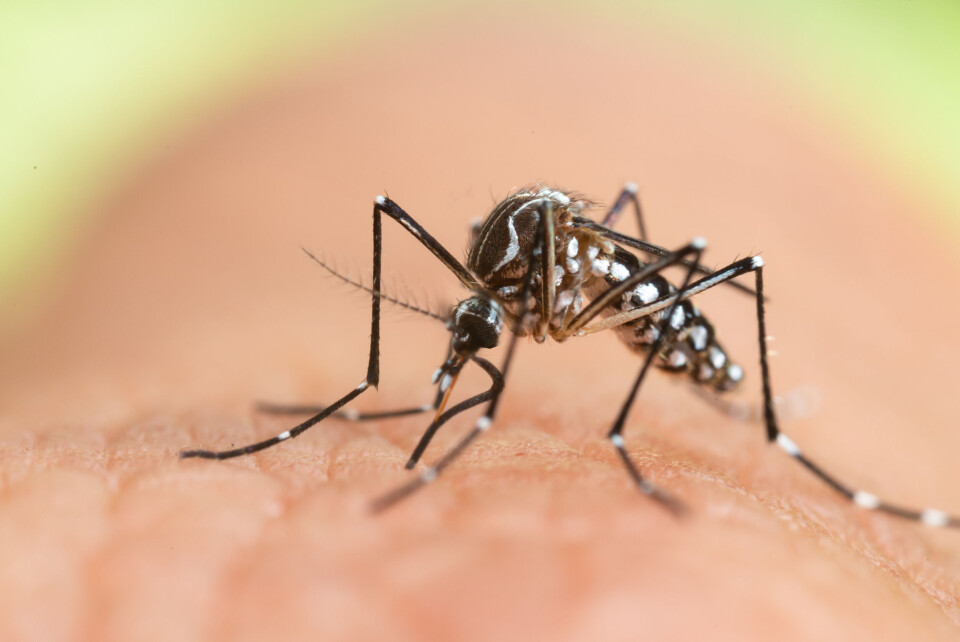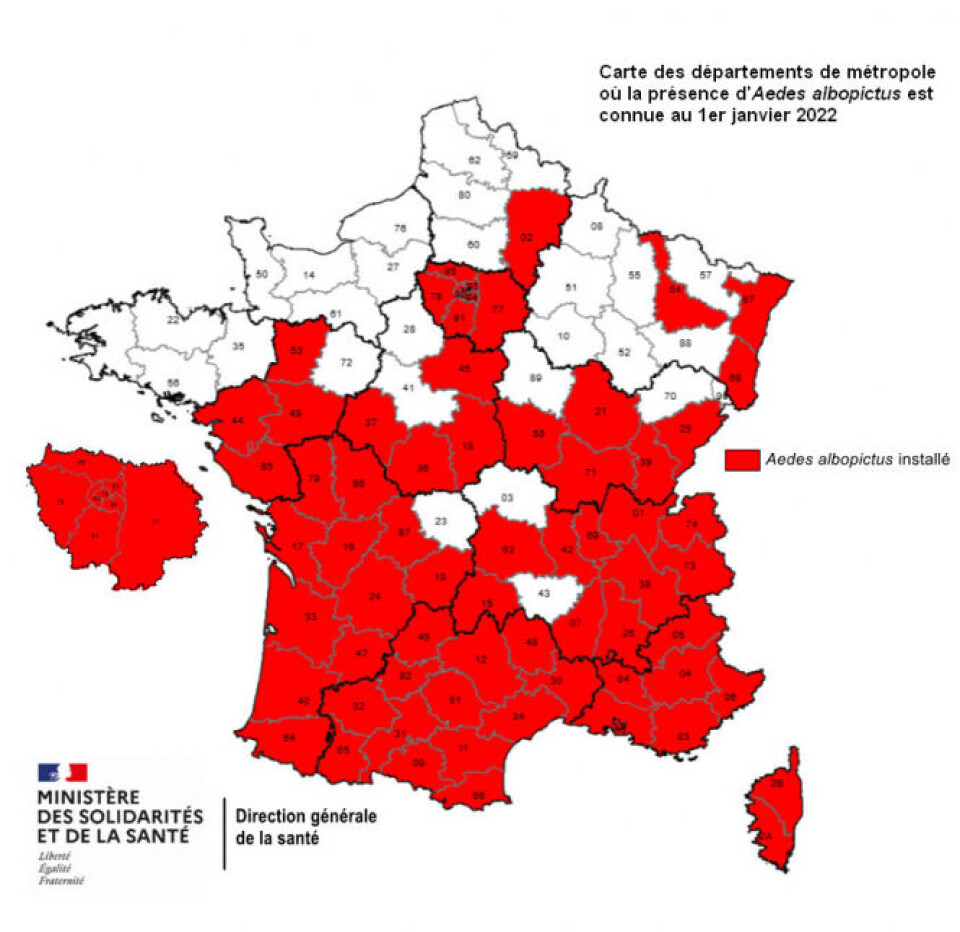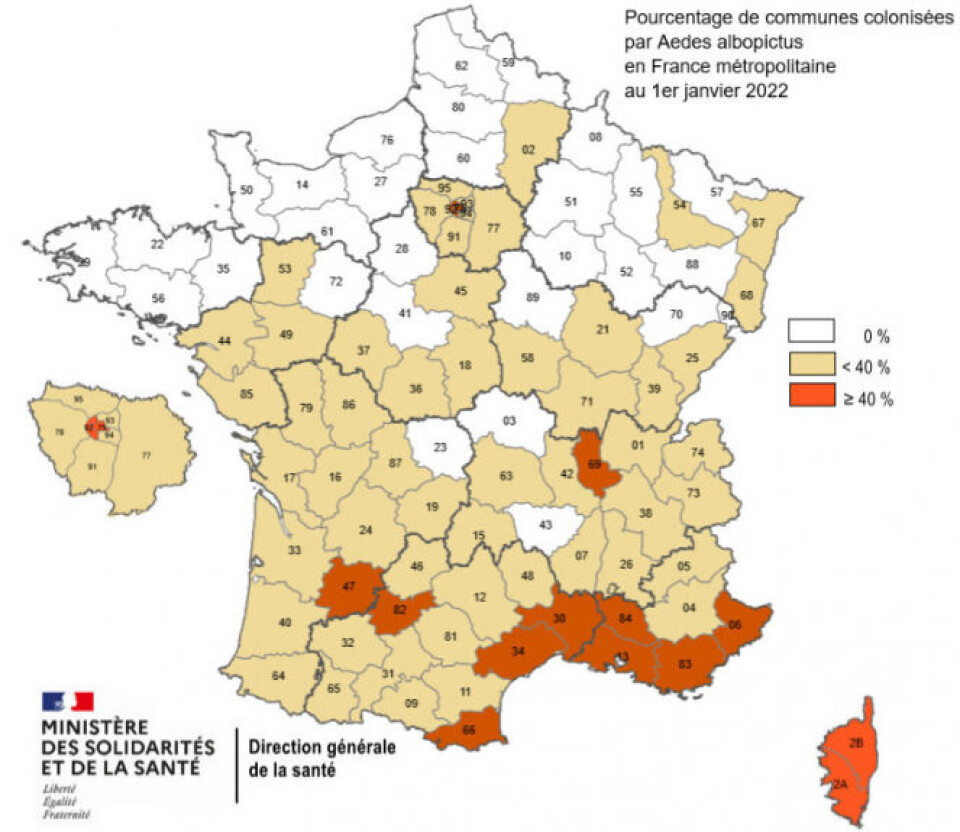-
More than 5,000 French communes use AI to identify poor rubbish sorting
Badly-sorted rubbish can cost millions so communes are turning to high-tech solutions
-
Tax on well-off retirees under consideration for 2026 budget
‘Nothing is off the table’ when it comes to finding €40 billion in savings says Labour Minister
-
Nice airport records passenger boom as tourists flock to city
Airport figures exceeded the pre-Covid record last year, with US visitors significant contributors
Briton infected with dengue fever in France: where are the risk areas?
Experts say climate change and travel mean more parts of Europe are ripe for outbreaks of dengue fever

A British woman was infected with dengue fever during a trip to visit family in Nice, southern France, according to an infectious diseases expert.
The 44-year-old was confirmed as having dengue fever by the Rare Imported Pathogens Laboratory (RIPL) in the UK after she visited a hospital A&E complaining of fever, headache, muscle pain, and a rash.
She was one of more than 30 people who contracted the virus in the local area.
She had returned from Nice the day before [in late 2022] and had not travelled anywhere else. She had been staying with family members, all of whom had also been unwell with the same symptoms and had not travelled anywhere else either, she said.
It was later confirmed that she and the family had been affected by a local outbreak of the fever. The disease is only spread by mosquitoes, not from person to person.
This means that the outbreak was caused by infected mosquitoes that were already in France.
This is also sometimes known as an ‘autochtone’ or ‘indigenous’ infection, meaning that it has been identified within the country itself, and not only in people who have travelled to areas traditionally known for dengue infection.
‘European countries are not immune’
Owain Donnelly, from the London School of Hygiene & Tropical Medicine, presented the woman’s case at the European Congress of Clinical Microbiology & Infectious Diseases in Copenhagen.
“This individual was part of an outbreak of over 30 locally transmitted cases in the south of France in 2022, which highlights the rapidly changing epidemiology [how it occurs] of dengue,” said Dr Donnelly.
“With climate change, particularly hotter temperatures and more rainfall, and increasing global trade and tourism, we may see more parts of Europe with the right combination of factors for dengue outbreaks.
“Historically, [tiger] mosquito vectors were only found in the tropics. However, with climate change, [tiger mosquitoes] have now been identified throughout southern Europe, meaning that this potentially deadly virus may be autochthonously transmitted there.”
Dengue can be fatal in 1-5% of people who contract it, although 75% are asymptomatic. The woman who reported symptoms in the UK did not need to be admitted to hospital and was monitored as an outpatient. She recovered in a short time.
Dr Oliver Brady, associate professor at the London School of Hygiene & Tropical Medicine told iNews: “The experience of southern France shows that European countries are not immune from dengue and, like all other countries, may struggle to contain dengue.”
The NHS in the UK has stated that dengue has been found in European countries including Croatia, Italy, Spain, Portugal and Madeira, and France.
How do you get dengue fever?
Dengue fever is spread by infected tiger mosquitoes. It is not spread from person to person. It is more common in tropical areas in Asia, and South America, and most infections in Europe are identified in people who have recently travelled to one of these regions.
However, tiger mosquitoes (Aedes albopictus) have become more prevalent in France in recent years.
Read more: France warns of increased risk of dengue fever from tiger mosquitoes
Read more: New dengue fever case in France, victim had not travelled to risk area
Where is dengue fever a risk in France?
The tiger mosquito has, as of the last official count in 2022, reached 67 departments so far, and counting. This includes all of the south, and a growing number of departments in the centre-north, as well as the northeast and Paris.

Map of departments where tiger mosquitoes have been identified, as of January 1, 2022. Photo credit: Sante.gouv.fr

Map of the percentage (0%, 40%) of towns and villages that have the tiger mosquito, by department, as of January 1, 2022. Photo credit: Sante.gouv.fr
What are the symptoms of dengue fever?
Dengue fever typically causes symptoms such as:
-
A high temperature
-
Nausea and vomiting
-
A headache
-
Pain behind the eyes
-
Joint, muscle and/or bone pain
-
Fatigue
-
Swollen glands
-
Bleeding gums
-
A red, ‘blotchy’ rash that usually disappears with pressure
The symptoms tend to develop between four to 10 days after being bitten by an infected mosquito.
If you have any of the above symptoms and believe that you could be at risk of dengue (such as having visited affected areas in France or somewhere typically associated with dengue), visit a doctor as soon as possible and let them know of your specific concerns.
If the symptoms intensify around day five - especially the fever, vomiting, and abdominal pain - you are advised to seek immediate emergency care, as this could be a sign of severe fever or haemorrhage.
As part of his report, Dr Donnelly said: “To ensure accurate diagnosis, physicians should consider testing for dengue if patients live in or have visited countries where [tiger mosquitoes] are found, and present with the typical constellation of symptoms, even if dengue is not widespread.
“Making the correct diagnosis not only has an impact on patients but also allows us to increase our understanding of dengue distribution and take appropriate steps to control outbreaks.”
How can I reduce the risk of getting dengue fever in France?
Between June to September 2022, regional health agencies (Agences Régionales de Santé) in France reported three separate outbreaks of dengue transmission contracted on national territory, by people who had not travelled abroad.
Because dengue is transmitted by tiger mosquitoes, the best way to avoid it is to reduce your risk of attracting the mosquitoes in the first place.
Read more: Warm French weather brings out mosquitoes: How to avoid being bitten
Ways to do this include:
-
Drain away all standing water (and re-do this regularly)
-
Install mosquito nets on your windows and doors, or place them around your bed
-
Burn citronella candles, ideally organic or homemade ones if possible, to avoid any toxic substances. (Some question whether citronella works, but others swear by it.)
-
Use repellent plugs that use organic substances
-
Use chemical repellents with DEET levels of 25-30%
-
Plant lemongrass, geraniums, garlic, rosemary, and mint in your garden, as these plants can help repel the insects naturally
Some of these products, including DEET, can be dangerous for children and pregnant women, so they should be used with caution. Prioritise organic products where possible.
Related articles
Mosquitoes in France: A scientist's advice for keeping them away
Rare case of ‘indigenous’ dengue confirmed in south of France
New dengue fever case in France, victim had not travelled to risk area
























